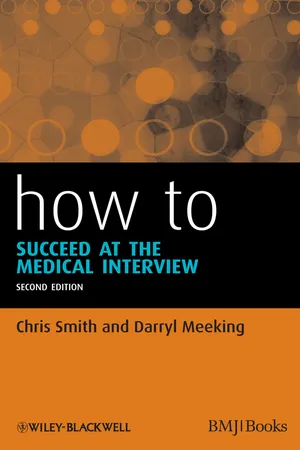
- English
- ePUB (mobile friendly)
- Available on iOS & Android
How to Succeed at the Medical Interview
About this book
How to Succeed at the Medical Interview provides candidates with a competitive edge. It reduces the likelihood of unexpected questions or situations and helps improve confidence before and during the medical interview.
This new second edition includes updated content on changes to the structure of healthcare and how this affects both the application and interview process. It details the types of questions that will be asked at medical interviews and also provides improved guidance for overseas doctors and healthcare professionals and for those seeking to practice abroad.
How to Succeed at the Medical Interview is the ideal guide for Foundation Programme trainees, Specialist Registrars and General Practitioner trainees. It is also valuable for healthcare professionals facing competitive medical interviews at any stage of their career.
Frequently asked questions
- Essential is ideal for learners and professionals who enjoy exploring a wide range of subjects. Access the Essential Library with 800,000+ trusted titles and best-sellers across business, personal growth, and the humanities. Includes unlimited reading time and Standard Read Aloud voice.
- Complete: Perfect for advanced learners and researchers needing full, unrestricted access. Unlock 1.4M+ books across hundreds of subjects, including academic and specialized titles. The Complete Plan also includes advanced features like Premium Read Aloud and Research Assistant.
Please note we cannot support devices running on iOS 13 and Android 7 or earlier. Learn more about using the app.
Information
Chapter 1
The medical interview
Introduction
The application process
- vacant Foundation posts
- trust doctor or locum posts
- senior medical posts.
- Stage 1: an electronic application form, the purpose of which is to check the eligibility of the candidate.
- Stage 2: national ‘Clinical Problem-solving’ and ‘Situational Judgement’ tests.
- Stage 3: a written exercise and three simulation exercises carried out by individual deaneries.
How are candidates shortlisted for ST and GP training posts?
- Qualifications
- Eligibility
- Career progression
- Fitness to practise
- Competency
- Language skills
- Clinical skills
- Personal skills
- Commitment to specialty
- Probity
- Academic and research achievements
- Appropriate medical qualification, for example, MBBS
- Eligible for General Medical Council (GMC) registration
- Evidence of achievement of Foundation competencies in line with GMC standards/good medical practice
- Maintaining good medical practice
- Good relationships/communication with patients
- Good working relationships with colleagues
- Good teaching and training
- Professionalism/probity
- Delivery of good acute clinical care
- Eligibility to work in the UK
- Up to date and fit to practise safely
- Capable of effective communication with patients/colleagues (medical training in English or appropriate International English Language Testing System (IELTS) scores)
- Meets professional health requirements
- Appropriate knowledge base and ability to apply clinical judgement
- Communication: adapting language appropriate to situation
- Problem solving/decision making: using logic and thought to solve and decide
- Managing others/teamwork: working effectively with others
- Sensitivity/empathy: taking in others' perspectives and treating others with understanding
- Organisation/planning: managing and prioritising time and situations effectively
- Vigilance/situational awareness monitoring and anticipating issues
- Coping with pressure operating under pressure, initiative and resilience
- Professional integrity: takes responsibility and respects all others
- Other activities and achievements relevant to medicine
- Demonstrates understanding of audit and research
- Evidence of academic/research achievements (desirable)
- Participation in audit (desirable)
- Experience and interest in teaching (desirable)
- National GP recruitment: www.gprecruitment.org
- MMCs: www.mmc.nhs.uk
- www.ct1recruitment.org.uk
- www.ct3recruitment.org.uk
The aims of the medical interview
Why does the medical interview exist?
Does everything hinge on the medical interview?
What does the interviewer expect?
Table of contents
- Cover
- Title Page
- Copyright
- Foreword
- Preface
- Acknowledgements
- Introduction
- Chapter 1: The medical interview
- Chapter 2: Preparing for the interview
- Chapter 3: Performing at the interview
- Chapter 4: Common interview questions
- Chapter 5: Interview questions that test your knowledge
- Chapter 6: Interview questions that test your generic skills
- Chapter 7: Competency-based tasks
- Index